Prime Minister Boris Johnson is championing solidarity at the G7 summit, defying criticism of cuts to UK foreign aid by sharing millions of doses of Covid vaccines with poor countries and promoting schooling for vulnerable children.
Heads of state and government of the world’s richest nations are meeting in Cornwall, southwest England, with the aim of creating a fairer, greener world post-pandemic.
At the top of their agenda is the more equitable distribution of vaccines, and an expected promise of donating one billion doses to the world’s poorest countries, as well as weaning developing nations off fossil fuels to slow climate change.
The G7’s focus is on recovery after the global health crisis, and also includes getting as many children as possible back into school after the disruption caused in 2020.
With this in mind, the UK government announced on Friday it would provide £430 million ($606 million, 501 million euros) to support the worst affected by being out of school — most of them girls — and called on its G7 allies to follow suit.
The money will go to the Global Partnership for Education, which supports schooling in developing countries.
“The best way we can lift countries out of poverty and lead a global recovery is by investing in education and particularly girls’ education,” said Johnson.
“It is a source of international shame that every day around the world, children bursting with potential are denied the chance to become titans of industry, scientific pioneers or leaders in any field, purely because they are female, their parents’ income or the place they were born.”
The situation has been made more acute by the pandemic, causing an unprecedented education crisis: 1.6 billion children were out of school across the world at the height of closures.
Britain’s financial contribution is part of a wider G7 action plan to get 40 million more girls into schools by 2025.
– ‘Insane’ –
NGOs have called the announcements a “step in the right direction”.
But they said Johnson can do better, accusing him of putting a gloss on the situation at a time when he has drastically slashed overseas development aid.
Johnson has blamed unforeseen pandemic spending for his decision to cut the budget from 0.7 percent to 0.5 percent of gross national income, or from £15 billion to £10 billion.
The decision, which he maintains is only temporary, has triggered a barrage of criticism at home and abroad, warnings about its effect on humanitarian projects and the damage to Britain’s reputation and post-Brexit international ambitions.
“I think it’s wonderful that the G7 is taking up a focus on girls’ education. It’s absolutely necessary,” Kira Boe, education policy lead at Oxfam, told AFP.
But she said education does not exist in a vacuum.
“There will most likely be children who will not survive Covid because there will no longer be support to water sanitation, hygiene… (and) who will therefore not make it into school,” she added.
The budget cut undermines Britain’s image as a “world leader”, as it prepares to host a $5 billion education summit with Kenya next month.
Thoko Elphick-Pooley, executive director at the Uniting to Combat Neglected Diseases partnership, said she was also disappointed.
“The spotlight is on the UK hosting the G7 but its government has just reneged on previous commitments that risk millions of life-saving donated drugs going to waste,” she said.
“Cuts to the aid budget have meant treatments and surgeries committed to tackle neglected tropical diseases, which disproportionately affect women and girls, won’t be delivered.”
Johnson brushed off the criticism, telling the BBC on Friday the country should be “incredibly proud of what we are doing in spite of the difficulties we are facing” with the pandemic.










